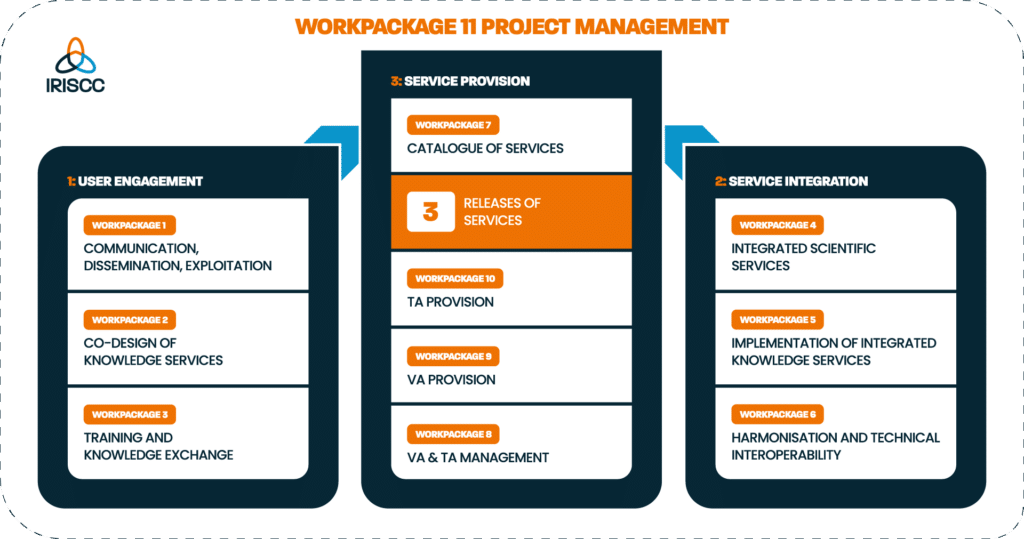This pillar ensures user-centric service development through co-creation and collaboration. Activities include communications & engagement campaigns, workshops, training, and knowledge sharing to build capacity and ensure wide-ranging impact.
How We Work
IRISCC tackles climate change risks by working hand-in-hand with users and stakeholders. Our three-pillar approach ensures you're at the center of everything we do.

Three Pillars
IRISCC delivers on its ambitious goals through three key actions:
1
1
User and Stakeholder Engagement (Pillar I)
2
2
Service Integration (Pillar II)
This pillar focuses on integrating existing capabilities across RIs. It accomplishes this through “Demonstrators” covering various climate change risks, fostering collaboration and knowledge exchange.
3
3
Service Provision (Pillar III)
This pillar makes integrated services accessible through the IRISCC Catalogue of Services. The Catalogue offers a range of access options, from virtual access to on-site visits, catering to diverse user needs.

Work Packages
WP1
+
Communication, dissemination, engagement, and exploitation management
- T1.1: Project Communication and Dissemination strategy and its implementation
- T1.2: Stakeholder mapping and engagement
- T1.3: Promotion of the IRISCC Catalogue of services
- T1.4: Innovation Management and Exploitation
- T1.5: Landscape analysis and strategic position of the Research Infrastructures
WP2
+
Co-design of IRISCC integrated knowledge services
- T2.1: Development of the overall concept for co-design of integrated Knowledge Services
- T2.2: Co-design activities on IRISCC integrated Knowledge Services with users, stakeholders, and
- T2.3: Testing with potential users the co-designed services and validation of services for implementation
WP3
+
Knowledge exchange and training of service providers and users of IRISCC services
- T3.1: IRISCC Training and Knowledge Exchange Plan
- T3.2: Training modules for climate change risk capacity building
- T3.3: Nurturing European R&I capacity with transferable skills
- T3.4: Ensuring continuous capacity building on exploitation of RI services beyond the project
WP4
+
Delivering integrated IRISCC Scientific Services
- T4.1: Defining the conditions for Demonstrators to successful implementation with KPIs
- T4.2: Providing the necessary set of climate risk model output supporting Demonstrators
- T4.3: Implementing the Demonstrators
- T4.4: Assessing maturity level for upscaling the integrated services
WP6
+
Integrated Knowledge Service Assessment
- T6.1: Harmonisation of access policies and procedures to IRISCC digital services
- T6.2: Harmonisation of procedures for transnational access
- T6.3: Formulating and deploying a technical interoperability and FAIRness framework to support
- T6.4: Designing and implementing a test procedure for integrated IRISCC services
- T6.5: Arranging a gateway from IS-ENES VRE to the IRISCC e-infra platform for providing access
- T6.6: Ensuring full interoperability and exchange with EOSC
- T6.7: Options and conditions for future integration of RI services with e-infrastructures
WP7
+
IRISCC Catalogue of Services
- T7.1: Co-design of IRISCC Catalogue of services
- T7.2: Validation and enhancement of the integrated and customised services for the IRISCC
- T7.3: Establishment of the strategic Access Programme for access to climate change risk services of
- T7.4: Ensuring the sustainability of the IRISCC Catalogue of services and service provision beyond
